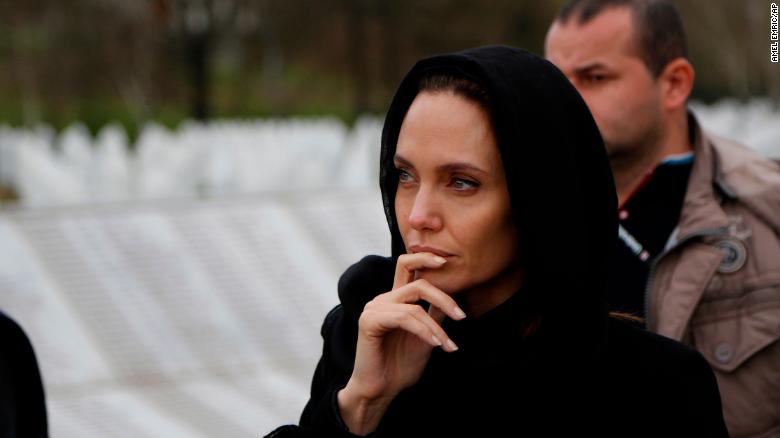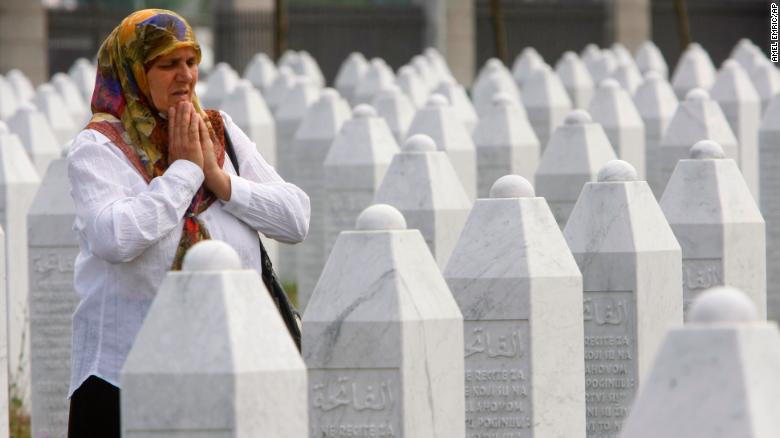News came today that Hatidža Mehmedović, who survived the war in Bosnia and led the Association of the Mothers of Srebrenica, had died in a hospital in Sarajevo.
I met Hatidža four years ago when I visited the Srebrenica Memorial, where the victims of the genocide -- the worst massacre on European soil since the Holocaust -- are buried. I remember it vividly. Sitting in a circle of other bereaved and widowed mothers of Srebrenica, quietly and with the utmost dignity, she told her story.

(Angelina Jolie visits the memorial center of Potocari near the eastern Bosnian town of Srebrenica in 2014.)
She painted a picture of life before the war, with her husband Abdullah and their two sons Azmir and Almir, who were 21 and 18 years old. She described the terrible days in July 1995, when they were forcibly separated from her and sent to their deaths, along with at least 8,000 other innocent men and boys. As well as her husband and sons, Hatidža lost her father, her two brothers, and scores of her extended family members.
Those who carried out the genocide went to considerable lengths to conceal or destroy the bodies of the victims. For 15 years, Hatidža searched for the remains of her family. She was one of the first survivors to return to Srebrenica. She lived bereaved and alone, facing threats and intimidation, in a climate of persistent attempts to deny the genocide.
She told me that when they finally found the remains of her husband and two sons, all she received to bury of Almir, her youngest, were two small leg bones. Instead of dwelling on the heartrending pain of that moment, she simply told me that she was fortunate. Many mothers, she said, still lacked even that small consolation.

(Hatidza Mehmedovic at the Potocari memorial center near Srebrenica.)
In many ways, Hatidža Mehmedović reminded me of the other Bosnian women I have met who survived the war, for the way she combined deep strength and resilience with tolerance and humility and a refusal to succumb to hate.
But Hatidža was also exceptional. For 23 years she was a tireless seeker of truth and justice. She never claimed any special status, but spoke on behalf of all the Mothers of Srebrenica. She did not distinguish between the victims, but regarded them as all equally worthy of dignity and recognition. Even as her health failed, she worked to organize aid convoys to take food and medicine to refugees in Syria. She died before her time, at just 65 years old, her death no doubt sadly hastened by all she had endured.
It is testimony to the depth of Bosnia's wounds that Hatidža did not live to see the end of the fight for justice and security for the survivors of Srebrenica. Others must take forward the burden she carried for so many years. But her example will live on, in the memories of all who knew her, and in the stories that we should all tell, wherever we live, so that the memory of Srebrenica never fades.
While her death fills me with sadness and regret for all the victims of the war in Bosnia-Herzegovina, I am sure that I am not alone in remembering Hatidža with gratitude and awe.
There are times to dwell on the many lessons of the Srebrenica genocide, and where violent hatred toward any group or people can lead. But as Hatidža is laid to rest and mourned by her country, it feels like a moment to reflect on the power of a single individual life.
Hatidža Mehmedović lived an honest life. She never allowed anyone to frighten her or to corrupt her sense of truth and fairness. We too may never see justice in our lifetimes, but we cannot go wrong if we follow her example.
Editor's Note : Angelina Jolie is an actor, director, special envoy for the UN Refugee Agency and co-founder of the Preventing Sexual Violence Initiative.
courtesy : cnn.com
Let the Truth be known. If you read VB and like VB, please be a VB Supporter and Help us deliver the Truth to one and all.
Mumbai (PTI): French President Emmanuel Macron, along with First Lady Brigitte Macron, left Mumbai for New Delhi on Wednesday after concluding his engagements here, including bilateral talks with Prime Minister Narendra Modi.
They were seen off at Chhatrapati Shivaji Maharaj International Airport by Maharashtra Governor Acharya Devvrat, Chief Minister Devendra Fadnavis and Deputy CM Eknath Shinde.
On Tuesday, Macron held discussions with Modi as part of efforts to further strengthen India-France strategic ties.
During the Mumbai visit, the French president and his wife also met some of India's top filmmakers and actors, and had an animated exchange with them about cinema, culture and collaboration.
President Macron is on an official visit to India from February 17 to 19 at the invitation of PM Modi to participate in the AI Impact Summit hosted by India in the national capital Delhi, besides the bilateral summit in Mumbai.
PM Modi will inaugurate the summit on February 19. As many as 20 heads of states, including French President Macron, will be present at the inaugural session, Electronics and IT Secretary S Krishnan said.




